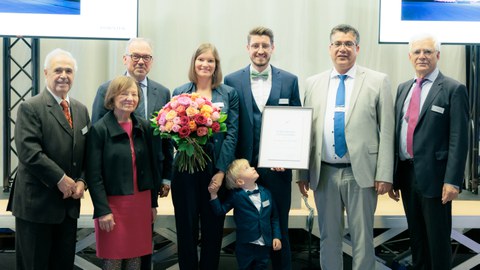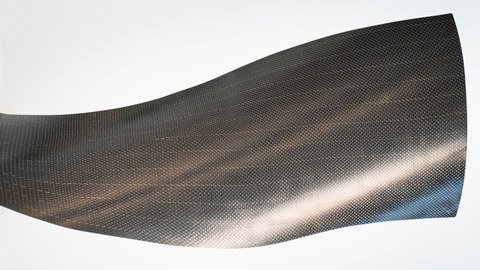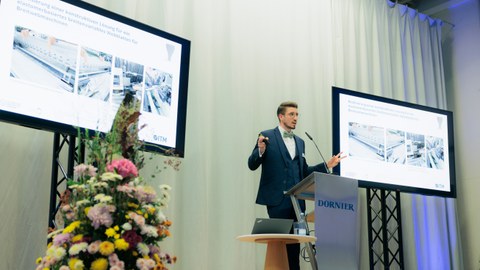Oct 25, 2024
Progress for lightweight construction: Peter Dornier Foundation Prize 2024 honors new technology for the direct production of complex 3D shell-shaped fabrics

from left to right Dr. Adnan Wahhoud, Maja Dornier, Peter D. Dornier, the Nuss family, Prof. Dr. Chokri Cherif, Prof. Dr. med. Wolf Mutschler
An innovative weaving process makes it possible for the first time to weave near-net-shape fabrics for shell-shaped lightweight components in one piece without cutting and laying processes. This could revolutionize the manufacture of fibre composite components for aerospace, vehicle construction and the production of sports equipment. Dresden-based textile mechanical engineer Dominik Nuß has now been awarded the Peter Dornier Foundation Prize 2024 for this development.
Aircraft turbine blade straight from the weaving machine
"For FRP components made of carbon with complex geometries, reinforcing fabrics have so far been produced, manually cut into many small parts, reassembled in the desired shape, draped and cured with plastic." A time-consuming and resource-intensive process that textile mechanical engineer Dominik Nuß is striving to optimize. As part of his doctorate, he therefore developed a completely new weaving process with which near-net-shape fabrics made of high-performance fibers such as aramid, glass or carbon for complex, shell-shaped lightweight components can be woven as a whole for the first time. To do this, he not only used take-off-free weaving without conventional fabric winding. He also developed a flexible weaving reed with which the fabric width can be adapted to the component width during the weaving process. "Pull-off-free and variable-width weaving means that complex 3D geometries such as turbine blades can be produced directly on the weaving machine - completely eliminating the time-consuming and waste-generating processes of cutting and laying," says Dominik Nuß.

Turbine blade made of decontoured high-performance carbon fiber fabric with complex, shell-shaped 3D geometry
"Process revolutionizes the production of reinforcement fabrics"
For his dissertation entitled "New processes for the integral production of shell-shaped fabric structures: technology, method and machine development", the textile researcher has now been awarded the Peter Dornier Foundation Prize 2024, endowed with 5,000 euros. It is a special distinction for the scientist: "The prize is a great honor for me. To be recognized by the company whose weaving machines my developments are based on is something very special - because, as we all know, nothing is more critical than a jury that is itself a specialist in the field," says Dr. Dominik Nuß, Research Group Leader for Weaving Technology at the Institute of Textile Machinery and High Performance Material Technology (ITM) at TU Dresden.
About the Peter Dornier Foundation Prize
The idea of the Peter Dornier Foundation Prize goes back to Peter Dornier (1917-2002), the founder of Lindauer DORNIER GmbH. The prize has been awarded annually since 2021 for outstanding scientific work by young people in the fields of textile, film and fiber composite technology as well as aerospace. The foundation's purpose also includes promoting medical research and supporting hospices for a self-determined and dignified life until the end.

